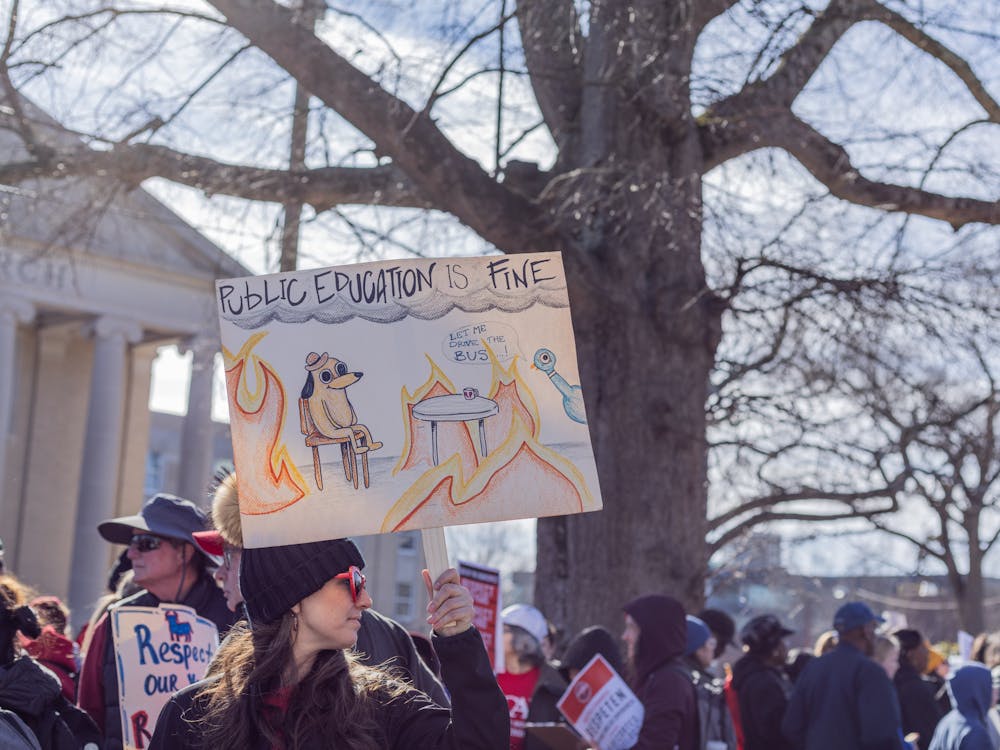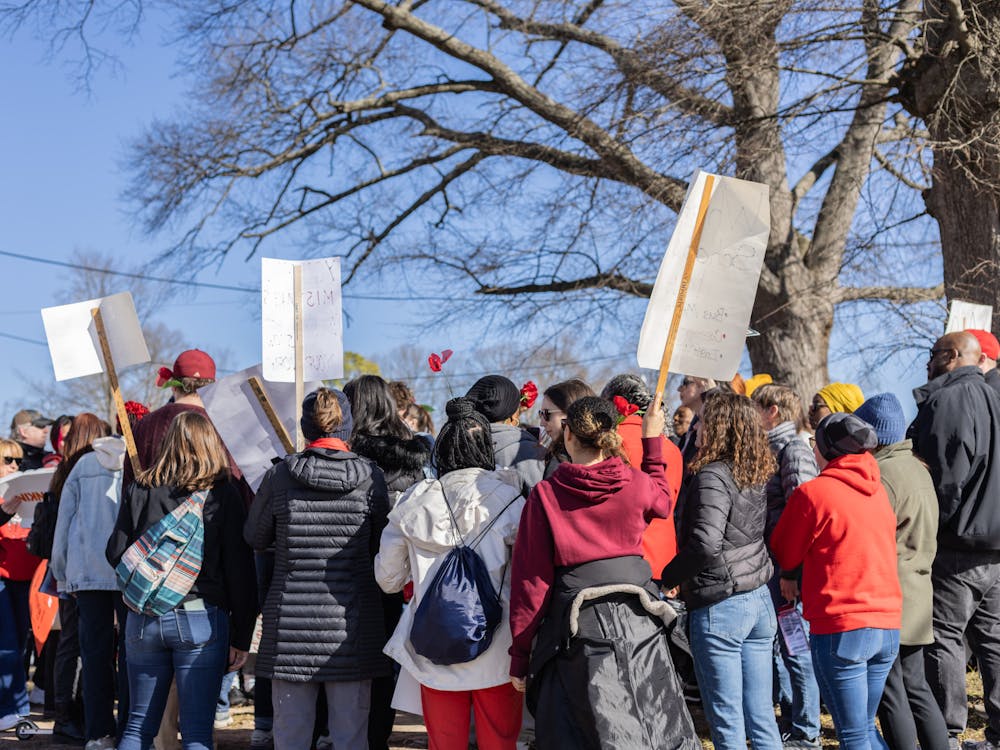Over 170 people gathered outside the Durham Public Schools Central Services building Monday morning to protest pay cuts for classified workers that were announced in mid-January.
DPS claims that the pay cuts were justified due to a previously mistaken budget, which resulted in over 1,300 employees being overpaid. The DPS Board of Education held a five-hour meeting last Friday, where they did not come to a conclusion about what will happen to workers' February pay.
The protest was organized by the Durham Association of Educators, an organization consisting of Durham educators and allies, including teachers and public school workers. DAE identifies itself as a union and is affiliated with the North Carolina Association of Educators and the National Education Association. Many protesters wore pins with “Majority Strong” written on them, referencing DAE’s goal of creating a majority union amongst DPS workers.
Zykeriah Carleton, an English and creative writing teacher at Durham School of the Arts, explained that classified workers refer to transportation drivers, custodial staff, cafeteria workers, instructional assistants and office staff.
Carleton emphasized that a substantial number of individuals are affected by the pay cuts, noting that anyone who contributes to school operations, but “isn’t in front of the classroom” falls under the term classified workers. Carleton also expressed that the treatment of classified workers was reflective of how DPS undervalues their work.
“They think these people are disposable in our school system, but they’re not. Our schools would not run without these people,” Carleton said.
Teachers, students, parents and classified workers from the seven public schools that were closed Monday assembled to make their demands heard by the DPS Board of Education. People at the protest represented Sandy Ridge Elementary School, Durham School of the Arts, Little River, Carrington Middle School, Morehead Montessori Magnet Elementary, E.K. Powe Elementary School and Bethesda Elementary.
DAE President Symone Kiddoo, who was a school social worker in the DPS, spoke over a microphone to the crowd that had gathered at around 10:45 a.m.
She highlighted that classified workers are “already pushed to the brink decades of underpayment, decades of overwork, decades of understaffed schools, intensifying student needs and increasing attacks on our profession.”
“Some of our lowest paid workers, essential workers who transported and fed our children through a pandemic, majority Black and brown workers, and majority women were promised wages that are now being cut,” Kiddoo added.
Students and parents showed their support by joining along in chants.
Jennifer Harrison, a teacher at Morehead Montessori and also a parent of two children in Durham elementary schools, said that students had been out of school for a few days because of the ongoing struggle between DAE and DPS. Harrison said that though it is important that students learn about the power of protest, it is also important that students are able to get back to regular school schedules.
Protesters held signs that stated the demands that DAE has for the school board. Cheryl Navalinski, a special education teaching assistant at the Durham School of the Arts, told The Chronicle that a primary aim of this week’s protest was to “restore our steps and commit to no pay cuts for February paychecks.''
DPS pays workers according to “steps,” which usually correspond one-to-one to years of experience. One of the major complaints of DPS workers and teachers is that many of them have been relegated to Step 0 and have experienced a pay cut.
Kelly Mumford, an instructional assistant working in special education at Durham School of the Arts, spoke to the crowd about how her pay has been cut and how DPS is not recognizing her experience as an educator.

A few months ago, Mumford moved to the area from New Jersey after serving as a special education teaching assistant for 20 years. Mumford chose to teach in the Durham Public Schools, rather than nearby schools such as Wake County schools because they promised to “match her years.”
This was Mumford’s understanding of her salary until Jan. 12 when she “received an email saying that [she’d] go from step 20 to zero.” Mumford explained that the pay cut meant that she would receive almost 700 dollars less per month.
Get The Chronicle straight to your inbox
Sign up for our weekly newsletter. Cancel at any time.
Along with restoring steps and pay, DAE is also asking that the DPS Board of Education offer affected staff an explanation for why their checks over the past three months did not match what they were “promised,” and that classified workers experience no further pay cuts.
DAE also demands that teachers and other school workers have more input in how the school board makes decisions moving forward. The DPS Board of Education will have a special meeting Wednesday at 6 p.m.
“We are at a breaking point and the only way forward is a real seat at the table,” Kiddoo said.

